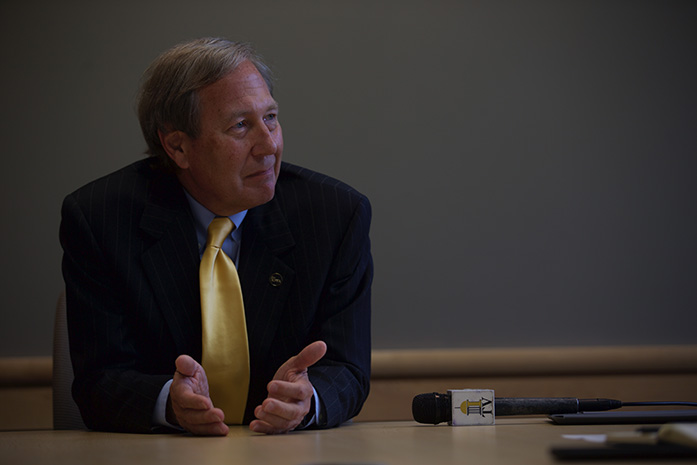Dear President Harreld:
One of the University of Iowa’s proudest traditions is its long history of robust shared governance. For many decades, the state Board of Regents, the president, Faculty Senate, and Student Government have cooperated to ensure that each has a voice appropriate to its legitimate interests and campus role in arriving at important decisions. For a century, the American Association of University Professors has been the national enunciator and protector of academic freedom and shared governance. As the local affiliate of the association, we cite two of your recent actions — the appointment of Jean Robillard as the College of Medicine dean and the extension of Athletics Director Gary Barta’s contract — that we believe are inconsistent with both association policies and Iowa’s highly valued governance practices.
Throughout the association’s policies, the term “primacy” describes the role each governance group should have in those areas of university operations most closely related to its direct responsibility. For example, the faculty has primacy in carrying out the university’s academic mission; its judgment in that area should generally be deferred to. In the “Statement on Government of Colleges and Universities,” adopted in 1967, AAUP emphasizes that “[t]he selection of academic deans … should be the responsibility of the president with the advice of, and in consultation with, the appropriate faculty.” In accordance with this approach, regent policies require the president to initiate a search for a departing dean and to keep the regents informed on its progress. (Regents’ Policy Manual, Chapter 4, section 4.05C) Yet on Feb. 9 of this year, your office announced that Robillard would occupy the combined offices of vice president for Medical Affairs and dean of the College of Medicine, replacing then-Dean Debra Schwinn in the latter role. The regents gave the change retroactive approval at its meeting on Feb. 25. So far as we are aware, no consultation with the faculty of the College of Medicine took place and certainly no search was conducted to identify Schwinn’s replacement.
Similarly, AAUP policy speaks clearly to the role of the faculty in overseeing and regulating intercollegiate athletics. In a 2002 policy titled “The Faculty Role in the Reform of Intercollegiate Athletics: Principles and Recommended Practices,” specific mention is made that “the preservation of integrity in the college athlete’s academic life is directly dependent upon the faculty’s ability to assert its primacy in ‘defining and monitoring the educational experiences of athletes’ … Therefore, it should be the responsibility of the institution to have the decisions that affect their lives as students made by those who know them as students – the faculty.” Surely one of the “decisions that affect [the] lives” of student athletes most strongly is the identity and vision of the university’s athletics director. Iowa has a university committee tasked to assist in searches for professional staff who work with student athletes and formulate and enforce policy with respect to intercollegiate athletics, the Presidential Committee on Athletics. This committee reports regularly to Faculty Senate as well as to the president.
Despite these directives that faculty be involved in important decisions involving student-athletes, early this year your office extended the contract of Barta for an additional five years. There was no consultation with the Athletics Committee. This happened in a year in which, though there was impressive success on the playing fields, significant concerns were raised regarding gender equity in athletics. The university now faces investigation by the U.S. Department of Education in response to student-athletes’ complaints.
We wish to be clear: AAUP does not claim that you made the wrong decision in either of the matters referred to above. Indeed, without consultation, a faculty body could not offer an informed opinion on either matter. It is the lack of consultation and the concomitant failure to accord the faculty its appropriate primacy in matters of university governance that we deplore. These decisions reflect the sort of top-down management style more associated with corporate than with academic governance. To the extent that is the model you follow as university president, it will validate the concerns of those who opposed your appointment. Although we welcome your enthusiasm for “shared governance on steroids,” we hope that it will be informed by past Iowa practice and AAUP policies. We look forward to meeting with you soon to discuss our concerns further.
Katherine Tachau
Professor of History
President, UI AAUP Chapter
Lois Cox
Clinical Professor of Law
Chairwoman,
Committee A
UI AAUP Chapter









